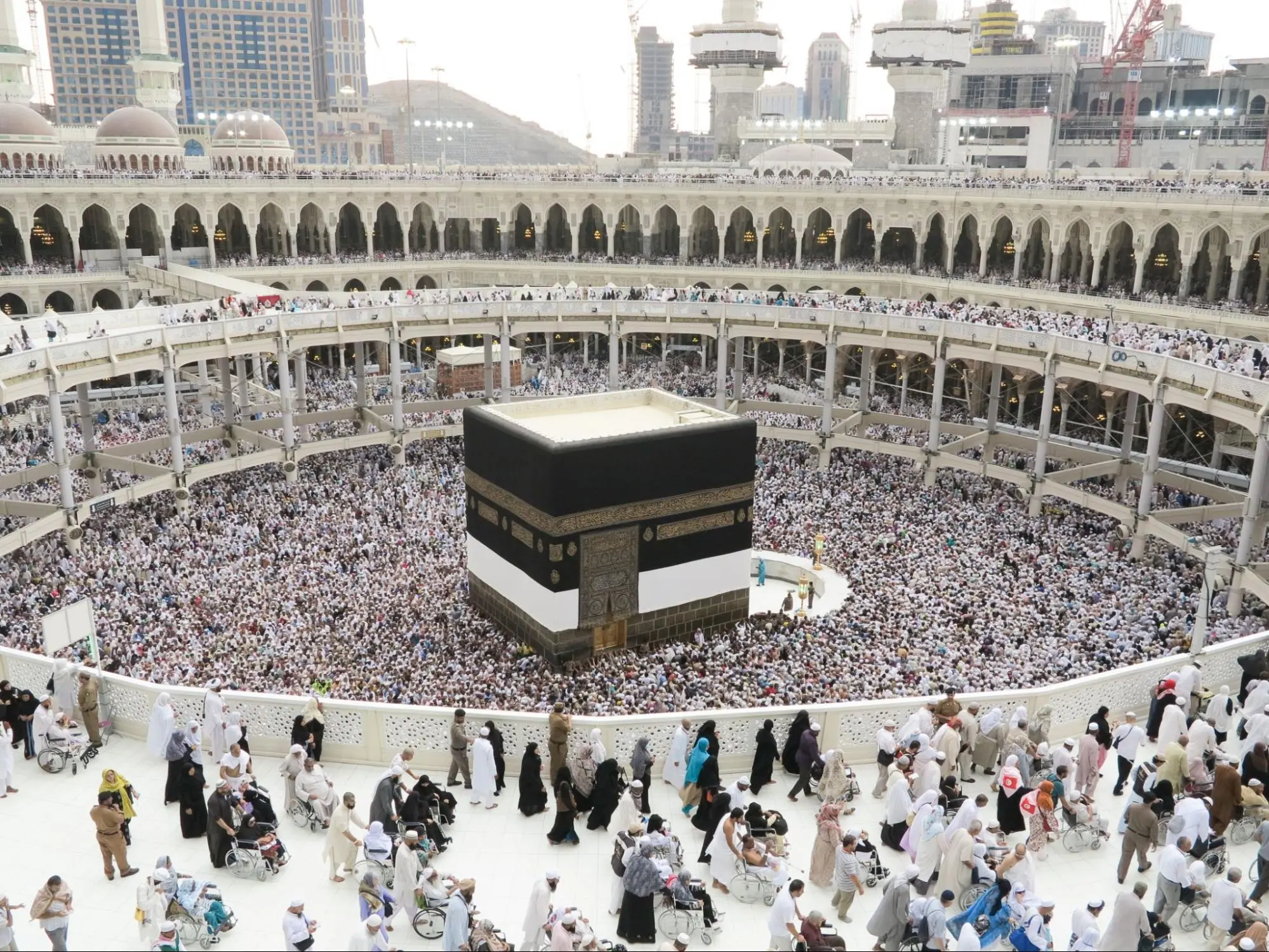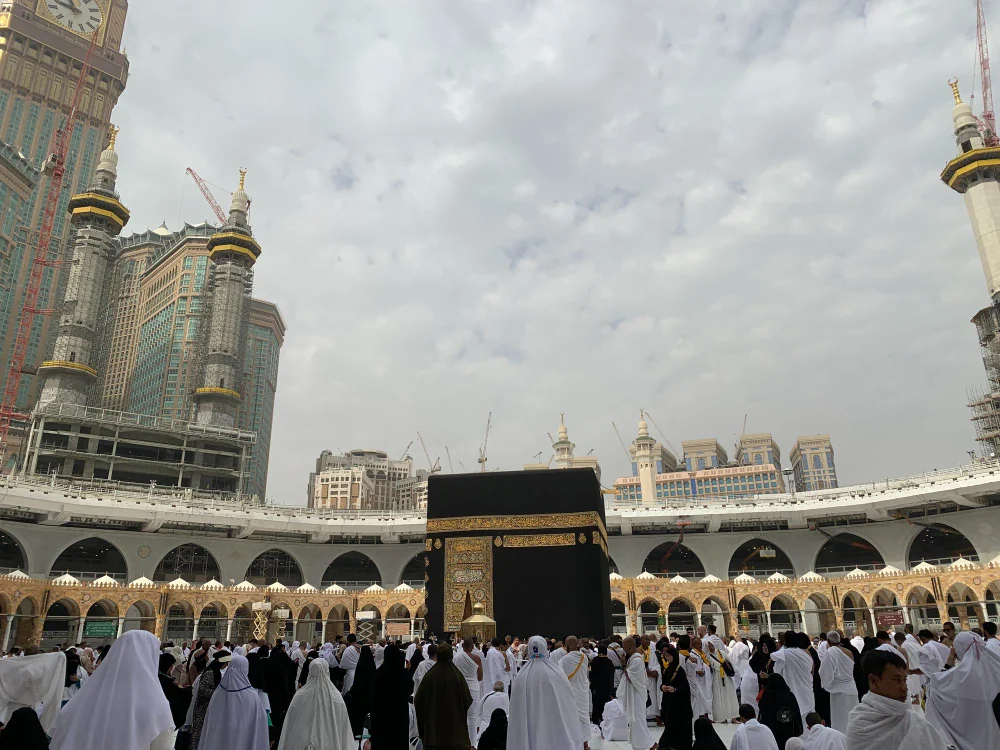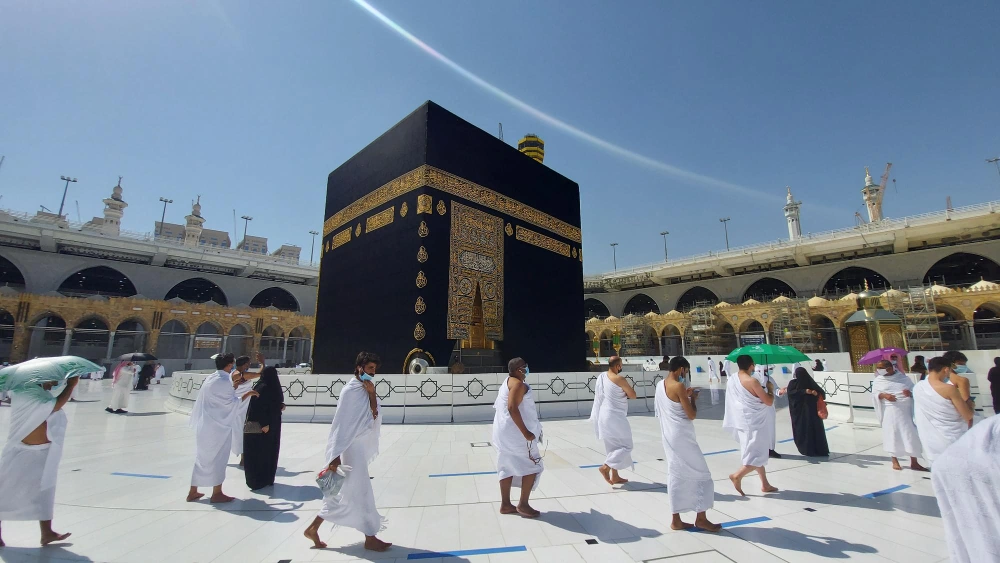Hajj and Umrah are two essential rituals for Muslims. Both involve a journey to the Kaaba. Although the concept of worship in both is similar, there are significant differences between Hajj and Umrah.
So, what are the differences between Hajj and Umrah? To understand them better, let's explore their definitions and requirements in this article.
1. Definitions of Hajj and Umrah
Before delving deeper into the differences between Hajj and Umrah, we must first understand their definitions:
1.1 Definition of Hajj
According to the Kamus Besar Bahasa Indonesia (KBBI), Hajj is one of the five pillars of Islam that must be performed by Muslim individuals who have the "ability." The Hajj pilgrimage includes visiting the Kaaba during the month of Dhu al-Hijjah, where acts of worship such as wearing ihram, performing tawaf, sa'i, and experiencing the sacred moment in the plains of Arafah are integral parts of the process.
Hajj is an annual pilgrimage to Baitullah (the Kaaba) performed to worship Allah Subhanahu Wa Ta'ala at the designated time.
1.2 Definition of Umrah
Umrah, on the other hand, is a pilgrimage to the holy places performed after arriving in Mecca. The Umrah procedure involves a series of actions, starting from wearing ihram to performing tawaf, sa'i, and shaving the head, but it does not include the wukuf (standing) at Arafah.
Umrah can be performed either concurrently with Hajj or outside the Hajj period. Due to its shorter duration and exclusion of wukuf, Umrah is often referred to as the "lesser" version of Hajj.
2. 8 Differences Between Hajj and Umrah
After understanding the definitions of Hajj and Umrah, let's explore the differences between them:
2.1 Legal Status
The first difference between Hajj and Umrah lies in their legal status. Performing Hajj is obligatory for those who are "able." This is supported by the Quranic verse:
"The Hajj pilgrimage is [during] well-known months, so whoever has made Hajj obligatory upon himself therein [by entering the state of ihram], there is [to be for him] no sexual relations and no disobedience and no disputing during Hajj. And whatever good you do – Allah knows it." (Quran, Ali 'Imran: 97)
The legal status of Umrah is subject to various opinions among scholars. The Maliki and most Hanafi scholars consider Umrah to be a highly recommended Sunnah. This is based on the following hadith:
Jabir bin 'Abdullah reported: The Messenger of Allah, peace and blessings be upon him, was asked about Umrah, is it obligatory or voluntary? The Prophet said, "No. But if you perform Umrah, it is better." (Sunan al-Tirmidhi)
Tholhah bin 'Ubaidillah reported: The Messenger of Allah, peace and blessings be upon him, said, "Hajj is Jihad and Umrah is voluntary." (Sunan Ibn Majah)
Some Shafi'i and Hanbali scholars argue that Umrah is obligatory once in a lifetime, in accordance with the Quranic verse:
"And complete the Hajj and Umrah for Allah." (Quran, Al-Baqarah: 196)
2.2 Timing of Performance
The second difference between Hajj and Umrah lies in their timing. The Hajj pilgrimage is only performed during the Hajj months and can only be done once a year. This is explained in the hadith:
"The months of Hajj are Shawwal, Dhul-Qi'dah, and ten days of Dhul-Hijjah." (Sahih al-Bukhari)
Hajj is performed from the 1st of Shawwal to the 13th of Dhul-Hijjah, with the day of Arafah falling on the 9th of Dhul-Hijjah.
Umrah, on the other hand, has no specific timing. It can be performed at any time without restrictions.
2.3 Pillars
In terms of ritual pillars, the difference between Hajj and Umrah lies in the wukuf (standing). Hajj includes wukuf as one of its pillars, while Umrah does not involve wukuf. The pillars of Hajj and Umrah are as follows:
- Ihram: Intention to perform Hajj or Umrah at a specific place, time, and manner.
- Wukuf (only for Hajj): Standing at Arafah from the afternoon of the 9th of Dhul-Hijjah until the dawn of the 10th.
- Tawaf Ifadah: Circumambulating the Kaaba seven times.
- Sa'i: Walking briskly between Safa and Marwah.
- Tahallul: Shaving the head or cutting the hair at least three hairs' length.
- Performing the rituals of Hajj or Umrah in order.
2.4 Obligatory Acts
Another difference between Hajj and Umrah lies in the obligatory acts performed. Obligatory acts are rituals performed as part of the Hajj rites. There are five obligatory acts in Hajj:
- Stating the intention for Ihram.
- Staying overnight at Muzdalifah on the night of the 10th of Dhul-Hijjah (Mabit).
- Staying overnight at Mina on the 11th, 12th, and 13th of Dhul-Hijjah.
- Stoning the pillars.
- Farewell Tawaf before leaving Mecca (Tawaf Wada').
On the other hand, Umrah has only two obligatory acts: assuming Ihram from the Miqat and abstaining from all prohibitions of Ihram. Failing to fulfill the obligatory acts does not invalidate the Hajj or Umrah, but one must pay compensation by way of a fine.
2.5 Duration of Worship
The duration of worship is another difference between Hajj and Umrah. Hajj requires a longer time compared to Umrah due to the greater number of rituals involved.
Hajj typically takes one week to perform its rituals. However, for regular Hajj pilgrims from Indonesia, the process can take approximately 40 days. During this time, pilgrims may also perform Umrah, visit other holy sites, or participate in Arbain at the Prophet's Mosque.
Umrah, on the other hand, can be completed within a shorter timeframe. Umrah pilgrims typically stay in Mecca for 9-12 days, depending on the Umrah package they choose.
2.6 Cost
One significant difference between Hajj and Umrah is the cost involved. In Hajj, there are two types of packages: Hajj Plus, regular Hajj, or individual Hajj. The Hajj Plus and individual Hajj packages are significantly more expensive than the regular Hajj package.
The cost of a regular Hajj package ranges from Rp 40 million to Rp 60 million, while the Hajj Plus package ranges from Rp 120 million to Rp 230 million. The individual Hajj package costs range from Rp 285 million to Rp 485 million. The price differences between Hajj packages are based on the departure date after registration, with regular Hajj requiring a waiting period of 11-47 years, Hajj Plus requiring 5-9 years, and individual Hajj requiring no waiting period.
Umrah costs start from Rp 25 million. The price varies depending on the departure date, duration of travel, type of package, and facilities provided.
2.7 Location
Another difference between Hajj and Umrah is the locations where the rituals are performed. While Hajj involves various locations such as Arafah, Muzdalifah, and Mina, Umrah is limited to Mecca and a visit to Medina.
2.8 Organizers
The organization of Hajj and Umrah differs as well. However, both are regulated by government-set regulations.
Regular Hajj is regulated by the Ministry of Religious Affairs through the Directorate General of Hajj and Umrah (Ditjen PHU), while Hajj Plus and individual Hajj are organized by a different body, the Special Hajj Organizer (PIHK).
For Umrah, the departure process can be determined by pilgrims through licensed travel agents acting as Umrah Travel Organizers (PPIU). However, all activities are subject to supervision and regulations enforced by relevant government authorities.
Also Read: Success and Blessings, Here Are 8 Recommended Ways to Trade in Islam
3. Mandatory Requirements for Hajj and Umrah
Both Hajj and Umrah have mandatory requirements that must be fulfilled. These mandatory requirements must be completed before embarking on these two rituals. There are seven things that are mandatory requirements for performing these two rituals, including:
3.1 Islam
Indeed, the Hajj ritual is the fifth pillar of Islam that completes the other pillars. If a non-Muslim completes the Hajj ritual in its entirety, then their worship is considered invalid. This also applies to the Umrah ritual.
3.2 Puberty
The second mandatory requirement for Hajj and Umrah is puberty or adulthood. If a person performing these two rituals has not reached puberty, then their worship is still considered valid but does not meet the required valid conditions.
3.3 Sanity
The next mandatory requirement for Hajj and Umrah is sanity. That is, being physically and mentally healthy. People who are abnormal, have lost their memory, or are insane are not obliged to perform the Hajj ritual.
3.4 Freedom
The requirement of 'freedom' in the Hajj and Umrah rituals means being free from any condition so as not to be bound by anything or colonization. Although slavery is no longer applicable now, this worship is not an obligation for slaves or indentured servants who are Muslims.
3.5 Capability
The next mandatory requirement for Hajj is the ability or istitha'ah. This is affirmed in the Quran which states:
Meaning: "Performing Hajj is a duty owed to Allah by people who are able to undertake the journey to the Kaaba." (Quran, Ali Imran: 97).
As for 'capability,' it includes financial and physical aspects. Financially, pilgrims are able to bear the cost of performing the Hajj or Umrah without disturbing other obligatory personal needs. While physically, it includes being physically capable of carrying out the activities of these two rituals.
3.6 Availability of Transportation
The availability of a properly functioning vehicle is a mandatory requirement for the Hajj and Umrah rituals. If one does not have a vehicle, then the pilgrim must have the ability to finance transportation or the journey of the Hajj and Umrah rituals they will undertake. This is to ensure that pilgrims will not encounter difficulties when traveling from one place to another.
3.7 Safe Journey
Safety means not encountering difficulties or being free from danger while performing the Hajj ritual. Journey safety encompasses oneself, one's soul, and one's property. Specifically for women who want to perform these two rituals, they must have a mahram or travel with trusted fellow women.
4. Tips for Preparing for Hajj and Umrah
BFI friends, after you have learned about the differences between Hajj and Umrah as well as the mandatory requirements for performing both, here are some tips you need to know to prepare for Hajj and Umrah:
4.1 Pay Attention to Physical Condition
Hajj and Umrah require prime stamina. Undergo a comprehensive health check-up and consult with a doctor about your condition. Prepare physically by exercising regularly, maintaining a healthy diet, and getting enough rest.
4.2 Prepare the Budget
The cost of Hajj and Umrah is quite significant. Make thorough financial planning. Calculate the estimated cost of travel, accommodation, visas, and personal needs. Prepare funds well in advance and save consistently.
4.3 Complete Required Documents
Prepare important documents such as passports, visas, identification cards, and proof of registration for Hajj/Umrah. Ensure all documents are complete and valid before departure.
4.4 Understand the Rules in Saudi Arabia
Learn the rules and culture in Saudi Arabia to avoid violations. Understand the rituals of Hajj/Umrah, appropriate clothing, and local customs.
BFI friends, these are the differences between Hajj and Umrah, the requirements, and the tips for performing them that you need to know. Both of these rituals can be performed if you have adequate funds. If you are interested in performing the Umrah ritual using your assets, BFI Finance can assist you. In the My Hajat program, you can pledge your vehicle registration certificate (BPKB) to carry out the Umrah ritual.
For more information about My Hajat and other Sharia financing products at BFI Finance, you can visit the following link.






